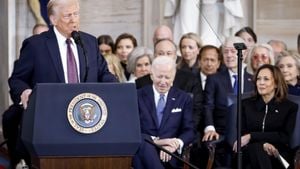Fuji Television, one of Japan's leading broadcasters, is facing significant backlash as over 50 companies have opted to withdraw their commercials following harassment allegations involving renowned talent Nakai Masahiro and related female parties. The controversy, which emerged mid-December 2022, has led to widespread reconsideration of advertising relationships, with notable brands including Toyota, Honda, and major insurance firms such as Japan Life and Aflac taking swift actions to cut ties with the network.
The reports concerning Nakai have insinuated involvement from Fuji Television staff, casting shadows over the broadcaster’s public image and trustworthiness. Following extensive media coverage, especially by Shukan Bunshun, manufacturers like Toyota and Honda immediately halted their advertising campaigns. By January 20, more than 50 corporations had made similar decisions, reflecting alarm over the management's response to the allegations presented.
This mass withdrawal unfolded on January 18, 2023, when corporate giants began to publicly announce their intentions to sever ties. These included major players like Seven & I Holdings and Nissan. The rationale provided by many of these companies encapsulated statements concerning their commitment to corporate responsibility and consumer trust. "We determined this based on comprehensive contemplation of the reported issues," indicated various spokespersons from the corporations involved.
On January 18, cosmetics company Kao also joined the withdrawal, emphasizing their dedication to human rights within corporate practices, thereby stating they would stop airing their commercials on Fuji Television. They transitioned their commercial airtime to public service announcements from AC Japan, though not all adjustments were completed until early the next day. Similar measures were taken by numerous other companies across various sectors, including food and beverage, automotive, and insurance industries.
Adding to the growing list of offending advertisers, announcements followed from firms like Suntory Holdings and Lawson, both of which indicated their advertising will be shifted, reflecting the increasing movement toward distancing from the troubled broadcaster. Advertisers faced pressures from clients and consumers who demanded clear accountability and transparency on Fuji Television’s part.
While many brands revealed they would reevaluate the timing of their resumed advertising, some have left it open-ended, hinting at the potential for long-term consequences if Fuji Television fails to earn back their trust. For example, during press conferences held by Fuji Television, sentiments were voiced expressing dissatisfaction with the vague and seemingly insufficient explanations provided by the management. "The CEO's explanation did not satisfy many people," reported executives from various companies who had halted their advertisements.
Responses from concerned stakeholders highlighted widespread calls for action. One spokesperson noted, "Fuji Television's press conferences were insufficient and did not gain the sympathy of viewers or clients." These comments underline the urgent need for Fuji Television to engage transparently and thoughtfully with both the public and its advertising partners.
To address these growing concerns, Fuji Television announced it would establish a non-biased committee led by external legal experts to oversee investigations of the allegations. This move is viewed as necessary to regain credibility, with hopes resting on the independence of the investigative process. Yet skepticism remains; questions arise about the transparency of this new committee amid fears it could still reflect corporate influences. A spokesperson clarified, "This committee intends to maintain high independence and expertise to deal with the matter presented alongside all corporate stakeholders."
Despite these attempts at clarification, many remain unconvinced. Prominent attorneys familiar with corporate governance have drawn comparisons between Fuji’s proposed committee and third-party guidelines established by Japan’s legal associations, which stress rigorous independence and have insisted on removing corporate associates from the investigative process to avoid conflicts of interest. "If it turns out internal employees are included on the committee, this compromises the investigation's premise of independence," warned attorney Masaru Saito, heavily involved with the guidelines.
Overall, the mounting fallout surrounding Fuji Television and its commercial partners serves as indicative of what can occur when trust erodes between broadcasters and corporate sponsors. Literature outlines this case as one of significant media fallout, drawing sharp distinctions between public perception and corporate response when addressing sensitive allegations, and the potential long-term impacts on brand loyalty and market relations. This case remains fluid and is anticipated to evolve with the foundation of the proposed investigation and subsequent corporate evaluations.
The ramifications observed are not confined to the financial aspects of ad revenues but extend significantly to consumer trust and the overarching responsibility entities hold toward their publics.
With all eyes on Fuji Television, the challenge now lies not merely with recovering advertisement sponsorships but also with restoring the trust of audiences who are carefully watching every step the broadcaster makes moving forward.



